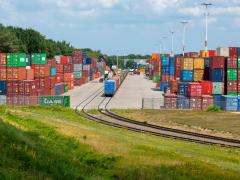The regional economic effects of flooding
This article analyses the regional economic effects of flooding on regions not directly affected. Results show that most regions neighbouring a flood-stricken region benefit from the flooding incident, because of increased demand for reconstruction and production capacity constraints in the affected region. Regions located further away or neighbouring regions without a direct export link to the affected region mostly suffer small losses. Such losses are due to the costs of increased inefficiencies in production process, which have to be paid for by all (indirectly) consuming regions. Overall, flooding causes regionally differentiated welfare effects.
Newly developed economic model
The analyses is based on a newly developed recursive dynamic multiregional supply-use model, combining linear programming and input–output (I–O) modelling to assess the economy-wide consequences of a natural disaster on a pan-European scale. The model is unique, since it is the first model of this type that takes both inefficiencies in production technologies and regional supply-side constraints explicitly into account. The model was used to analyse three types of flooding in the Dutch Rotterdam region.
Authors
Specifications
- Publication title
- The regional economic effects of flooding
- Publication date
- 28 September 2016
- Publication type
- Publication
- Magazine
- Economic Systems Research, volume 28, 2016
- Product number
- 1601




